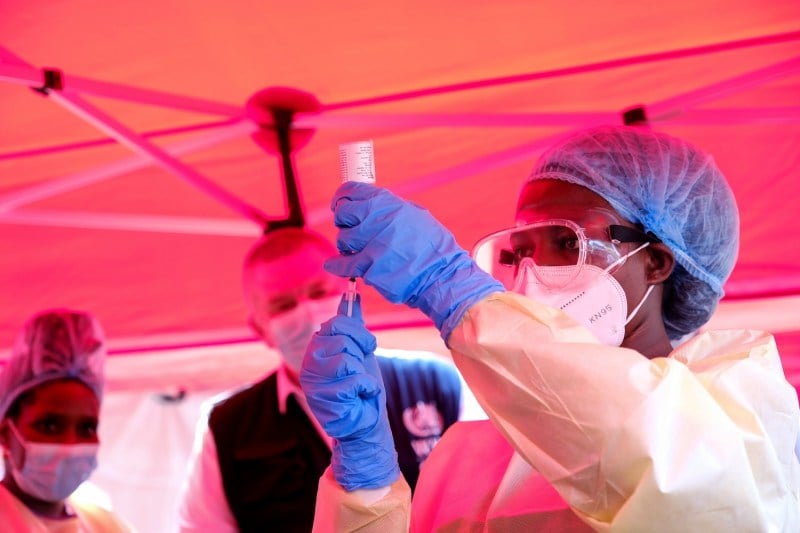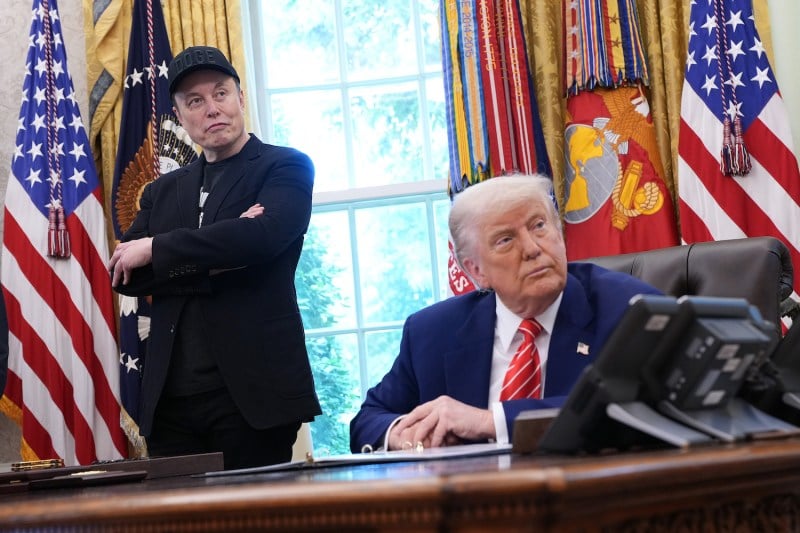Health Is a Cornerstone of Global Security

Health Is a Cornerstone of Global Security
Without it, inequality is exacerbated and political unrest spreads.
A member of a medical team at Mulago Referral Hospital prepares to administer a vaccine for an Ebola vaccination trial in Kampala, Uganda, on Feb. 3. Hajarah Nalwadda/Getty Images
There is a critical but often overlooked element at the heart of many issues facing the world in 2025: health.
Donald Trump has charged into his second term as president of the United States with a seismic shift in foreign policy, a sweeping foreign aid freeze, and upended rules of engagement that have left many stunned. Canada, France, and Germany are grappling with political upheaval, and globally, the domino effects of migration, climate change, economic instability, and disinformation are stretching societies to their limits.
There is a critical but often overlooked element at the heart of many issues facing the world in 2025: health.
Donald Trump has charged into his second term as president of the United States with a seismic shift in foreign policy, a sweeping foreign aid freeze, and upended rules of engagement that have left many stunned. Canada, France, and Germany are grappling with political upheaval, and globally, the domino effects of migration, climate change, economic instability, and disinformation are stretching societies to their limits.
These challenges are not isolated; they are deeply interconnected. And if we continue to sideline health—or cut its funding in favor of more traditional security priorities—then we risk deepening them.
Recent years have shown us that health is not merely a public good or a social issue but rather a cornerstone of national and global security. From extreme weather events displacing millions without access to health care infrastructure to pandemics straining markets, poor health weakens communities, undermines economies, exacerbates inequalities, and fuels political unrest. To safeguard our collective future, we must rethink health as one of our first lines of defense.
Poor health isn’t just a personal crisis—it’s an economic one. When a person gets sick, this not only threatens their well-being but also risks pushing their household below the poverty line. Take noncommunicable disease. A study conducted in Nigeria estimated in 2018 that these conditions—such as cardiovascular disease, cancer, and diabetes—forced 30 percent of affected families to endure catastrophic financial expenditures.
If the affected person is an employee, the impact extends to the workplace. In the United States, illness-related loss in productivity costs businesses $575 billion annually.
If illness can be prevented, then it not only spares personal tragedy, but also avoids treatment costs and broader economic impacts. Fit-for-purpose health systems—which prioritize universal health coverage, a diverse and well distributed workforce, and responsiveness to meet existing and future burdens of disease—an safeguard GDP growth and strengthen economic resilience.
Furthermore, poor health often aligns with economic disparities, fueling cycles of inequity in which illness deepens poverty. Inequity, in turn, poses a significant threat to security. Research conducted by the Pathfinders coalition found that a 1 percent rise in the economic inequality index corelates with a 0.23 percent decline in state legitimacy, and in wealthier nations, higher income inequality often leads to greater economic instability.
These are not abstract concerns. Inequity fosters discontent, weakens social cohesion, and creates fertile ground for extremism and violent populism. Yet the connection between poor health and insecurity is frequently overlooked or underestimated.
Much of the same can be said for poor health as a driver of migration. People migrate in search of better health services, fleeing environments where disease burdens are high and health care is inaccessible. Since 2015, more than 7 million Venezuelans have migrated, in part, amid the deterioration of the health care system and the rising burdens of infectious diseases.
Climate change is worsening these pressures, with health burdens escalating and care infrastructure and resources coming under threat. The Institute for Economics and Peace found that by 2050, up to 1.2 billion people globally could be displaced by climate-related factors.
This mass displacement will amplify health challenges. With large numbers of people on the move without humane policies and protective systems in place, local health systems, public services, and political stability in both transit and host countries will be strained. Rising risks of outbreaks, pandemics, and disease resurgence due to vaccine misinformation will further complicate the situation. As these pressures intensify, so too does the potential for health crises that no border policy can fully contain.
While the data is ample and clear, how to move forward is not. Significant global and existential challenges make change—including prioritizing health—difficult.
The growing consolidation of wealth and inequitable financial policies, which have concentrated power into the hands of a few, has fostered the rise of neo-oligarchs and other influential nonstate actors who wield significant—and growing—control over political, social, and economic agendas.
Compounded by both misinformation and disinformation, which deepen mistrust and create “alternate” realities, this dynamic not only exacerbates economic disparities but also undermines the capacity of governments to act independently and for the global good. Engaging these powerful actors to invest in health and social protection is now a necessity—and one that requires outlining the confluence of their interests with the greater good.
To address this situation, we need a fundamental shift in how we view health.
First, our understanding of health security must broaden. Traditionally, it has been defined in terms of pandemics, biological threats, and medical countermeasures. Yet given the broad and insidious impacts of poor health and weak health care systems, this issue must be centered in both global and national political, economic, and social agendas.
Reframing health within the security agenda requires embracing its economic power. Both private and public sectors must invest in health as an engine of economic growth.
Health protection and promotion boost productivity. Government, philanthropic, and private sector investments must target health delivery systems, public health, insurance, and equitable access to a basic package of services for individuals and workforces.
New health-focused metrics must be integrated into bottom lines across sectors, measuring lost productivity to highlight health’s impact on financial, political, and social systems while driving accountability for progress.
In the long run, investing in health saves both lives and money. The Trust for American Health found that every dollar spent on evidence-based prevention programs yields $5.60 in savings. Multiple studies demonstrate the significantly lower cost of preventing versus managing pandemics, for example.
Second, the global health security agenda must expand to include prevention, universal health coverage, and quality care.
Strengthening health systems is essential to address cascading threats such as climate change, pandemics, antimicrobial resistance, and other emergencies. This requires building a well-trained, evenly distributed health workforce; adopting globally recognized “One Health” approaches that recognize the interconnectedness of human, animal, and environmental health to prevent and address global health threats; and investing in resilient health infrastructure capable of withstanding climate-related and other shocks. This is true at home and abroad.
Addressing these challenges requires rethinking how we finance global health. Innovative financial tools such as health bonds, debt swaps, and special drawing rights—an international reserve asset created by the International Monetary Fund that helps countries access liquidity without accruing new debt—offer countries the fiscal space needed to invest in resilient health systems, pandemic preparedness, and solutions to other complex health challenges. As Washington moves to significantly scale back foreign assistance, traditional financing solutions will no longer be enough.
Third, while there is a temptation to turn inward—a trend fueled by today’s isolationist politics—it is critical to invest in international cooperation. The recent freeze on U.S. foreign assistance, including funding for critical health programs, leaves both Americans and communities worldwide less safe. The impact of the freeze undercuts critical information, systems, human resources and jobs, infrastructure essential for disease surveillance and management, food and water security, research and innovation, and economic growth. Moreover, it diminishes the United States’ strategic influence, ceding ground to other global powers eager to fill the void.
Pandemics, disease, and health inequities know no borders. Uganda is facing an Ebola outbreak, and the United States is responding to increasing cases of bird flu in animals and humans. National security depends on agreement frameworks such as the proposed global pandemic treaty, international health regulations, and antimicrobial resistance strategies.
The decision by the United States to withdraw from the Paris climate agreement and the World Health Organization will only compound the challenges we face. Retreating from international cooperation is not just shortsighted—it’s dangerous.
Like any prescription, this comes with a health warning. This paradigm should not be used to justify reactionary, populist, or unscientific border security measures.
Instead, leaders must work together to invest in strengthening health systems and the well-being of populations around the globe.
Regardless of the U.S. administration’s foreign-policy stance, all governments should view health investments as defending their populations’ well-being, security, and capabilities. The upfront costs will more than pay off in long-term savings by preventing far greater losses.
The private sector must begin to recognize that poor health undermines worker productivity and the bottom line. Investing in health helps companies do well while doing good. Successful leadership today requires prioritizing long-term sustainability and financial success. Prioritizing health achieves both.
Investing in health is not just a moral imperative; it is an investment in the resilience of economies, the stability of borders, and the security of nations worldwide.
Vanessa Kerry is the co-founder and CEO of Seed Global Health, a nonprofit organization focused on strengthening health systems. In June 2023, Kerry was appointed as the World Health Organization’s special envoy for climate change and health. Kerry is a pulmonary and critical care-trained physician and the director of global and climate health policy at Harvard T.H. Chan School of Public Health. She also serves as the director of global public policy at the Massachusetts General Hospital Center for Global Health.
More from Foreign Policy
-

Russian President Vladimir Putin looks on during a press conference after meeting with French President in Moscow, on February 7, 2022. The Domino Theory Is Coming for Putin
A series of setbacks for Russia is only gaining momentum.
-

The container ship Gunde Maersk sits docked at the Port of Oakland on June 24, 2024 in Oakland, California. How Denmark Can Hit Back Against Trump on Greenland
The White House is threatening a close ally with a trade war or worse—but Copenhagen has leverage that could inflict instant pain on the U.S. economy.
-

Donald Trump speaks during an event commemorating the 400th Anniversary of the First Representative Legislative Assembly in Jamestown, Virginia on July 30, 2019. This Could Be ‘Peak Trump’
His return to power has been impressive—but the hard work is about to begin.
-

US Secretary of State Marco Rubio greets employees at the State Department in Washington, DC, on January 21, 2025. The National Security Establishment Needs Working-Class Americans
President Trump has an opportunity to unleash underutilized talent in tackling dangers at home and abroad.









Join the Conversation
Commenting on this and other recent articles is just one benefit of a Foreign Policy subscription.
Already a subscriber?
.
Subscribe
Subscribe
View Comments
Join the Conversation
Join the conversation on this and other recent Foreign Policy articles when you subscribe now.
Subscribe
Subscribe
Not your account?
View Comments
Join the Conversation
Please follow our comment guidelines, stay on topic, and be civil, courteous, and respectful of others’ beliefs.
Change your username |
Log out
Change your username:
CANCEL
Confirm your username to get started.
The default username below has been generated using the first name and last initial on your FP subscriber account. Usernames may be updated at any time and must not contain inappropriate or offensive language.